Herbal Medicine
Mercury Retrograde: The Covid Edition
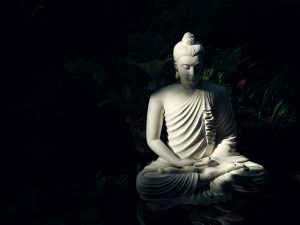 But isn’t it just like Mercury Retrograde to bring with it a wave of coronavirus to add to its usual technology issues, transportation delays, and miscommunications? I am no astrology expert, though it is a science that I enjoy and observe accuracy in, and question when it is mindlessly dismissed, since the absence of belief obviously requires just as much blind faith as belief.
But isn’t it just like Mercury Retrograde to bring with it a wave of coronavirus to add to its usual technology issues, transportation delays, and miscommunications? I am no astrology expert, though it is a science that I enjoy and observe accuracy in, and question when it is mindlessly dismissed, since the absence of belief obviously requires just as much blind faith as belief.
As we presently reside in what is arguably 2023’s first Covid wave, we’ve concurrently embarked upon the “pre-shadow” of Mercury’s retrograde. This means the planet has just begun to circulate in its reverse direction, which can impact Earth and its inhabitants in the aforementioned ways. This will last until mid-September, and recommendations are as follows:
- Plan for delays, not just logistically, but emotionally. Trains will be even worse and slower than usual, and you will be late for appointments. Life will go on. Try to breathe and/or text-vent to a loved one to keep your cool. It’s not fair, but it always happens—especially on the MTA or New Jersey Transit.
- Plan for technology problems: Lack of service on your phone, web sites not loading, calls dropping, documents getting accidentally erased, etc. This can be infuriating, but is generally not as bad if we expect and accept it as a matter-of-fact byproduct of the temporary cosmic energy we find ourselves in.
- Plan for communication problems. Someone you love will probably say something triggering in the next 6 weeks, and/or you will erroneously hear or misunderstand them. Clarify before you react, try to take a deep breath, remember when we are, and either respond calmly or pick up the dialogue in October (if you can wait that long).
- Be careful. This must be the new dad in me talking, but be sure to look both ways when crossing the street, drive a bit more carefully, and take care around glasses and hot surfaces. Personally, I find myself to be way clumsier during these times, once having knocked down an entire shelf of wine glasses in a restaurant I was working at in Beverly Hills. Not my finest moment.
- Finally, now more than ever, take care of yourself. I also find myself more prone to illness and injury during Mercury retrogrades, and as this one has bestowed upon us what is arguably the year’s first coronavirus, it is that much more important. Eat warm breakfasts, warm everything, steamed vegetables, hydrate, exercise in moderation, and go to sleep between 10-11pm. Stress management indicated as always.
The first stage of Covid is generally treated with an individualized version of the formula: “Huo Xiang Zheng Qi San,” which interestingly targets fluid retention in the gastrointestinal microbiome. This is generally advisable only on the very first day. Once the virus is in the throat or chest we’re almost invariably looking at one of the most famous formulas in all of Chinese Medicine, “Xiao Chai Hu Tang,” still modified to the unique patient, but with the intention of opening the chest and lungs, downbearing qi, and reducing heat and/or fever symptoms. Past this stage things become more interesting. Per usual, there is no one size fits all formula, but instead many ways we can prescribe based on constantly evolving symptoms and tongue appearance. Time is of the essence with this crafty, clever virus, so if you should contract it please contact me as soon as possible for a virtual consultation. Spare no expense. You don’t want long Covid.
I am not an “anti-vaxxer,” but based on my clinical observations in the past few years I can understand why some people would be wary of certain vaccines. I cannot, however, fathom why we cannot as a society adopt masks as a standard practice during waves in crowded spaces. While most people do fine with Covid, it is a gross over-simplification to say: “it’s just like the flu.” The flu almost never had summertime waves (Covid has had one every year), and almost never caused so many long-term neurological and cardiovascular diseases. I agree that we cannot live in fear—nor should we live in denial.
For the next month try to not snap at the pedestrians or cars that cut you off in public. Try and accept that that web site just won’t load when you want it to, that you’re going to be late, and things just will not get done according to schedule. Mercury’s retrograde might be viewed as Buddha’s messenger, to teach us unattachment, acceptance, and patience, in the face of a lifetime of the opposite conditionings. I’m speaking here to myself as much as anyone else.
Counteract Summer Heat With Chinese Herbal Teas
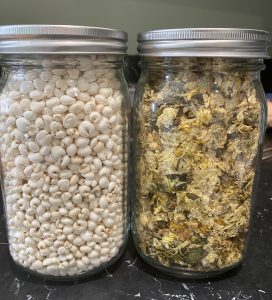
In spite of thus far boasting minimal over-heated days that inspire associations of barbecues and the beach, Summer is upon us
At home we joined our community pool, which is supposedly very popular and only a short walk from our home, but are yet to throw the baby in, as the only days that temperature might have permitted have been of coinciding rainstorms. The humidity just recently arrived, which for me is a bit of an ironic breath of fresh air, as a New York (New Jersey) summer sans the dense filth of 90-degree oppression on train platforms would resonate as just another bittersweet symptom of global warming.
Chinese Medicine appropriately labels this as “damp heat,” a very serious pathogen that genetically applies to yours truly and is nothing to be snoozed at. When dampness, or pathogenic body fluids mix with inflammatory heat they form an often impenetrable pathogen the Chinese label as “phlegm,” and “the cause of 1000 diseases.”
“Phlegm” in our medicine refers to not only that of the lungs and sinuses, but also the plaques that create arteriosclerosis, polyps, Alzheimer’s Disease, fatty liver, and I suppose about 1000 more illnesses. If someone is genetically susceptible to heat, left untreated their own dampness will inevitably transform into “damp heat” and become that much more difficult to resolve. Think many cases of autoimmune disease, cancers, and diagnoses of similar gravities.
Typically, the American trademarks of summer are in direct opposition to Eastern Medicine’s advice for mitigating the side effects of the external damp heat. Red meat and barbecue are sources of damp heat, as is alcohol—especially beer—spicy foods, or shellfish. As one of a family of many gout sufferers I must pick my spot wisely to indulge in one of my favorite summertime meals, oysters and some snobby, local IPA. At the least I always attempt to resolve such indulgences’ side effects on their backends.
More cooling foods and drinks that should be ingested liberally include watermelon, cucumber, celery (or celery juice), lemon, radishes, and of course chamomile or mint teas. Other recommended food grade medicinal teas are ju hua (chrsyanthemum flower) and yi yi ren (job’s tears/pearl barley), both of which should be available at any Asian market.
While the former is great for clearing heat in the upper portion of the body—think possibly headaches, summer dizziness, styes, and any issues of redness around the eyes—the latter is directed more to the intestines and urogenital microbiome. This time of year people are more prone to hyperhidrosis below the belt, swelling of the limbs, UTI’s, hemorrhoids, or stickier stools. If you wish to live in accord with the season and do better than low-quality store-bought herbal teas, I recommend getting these ingredients for tea at home.
30 grams of job’s tears + 10 grams chrysanthemum + 8 cups of water.
Boil and simmer for 40 minutes, drain out the herbs, and drink the slightly bitter, earthy tea. If you cannot measure grams and/or want to make a full pitcher for the week it’s fine to eyeball the measurements, simply aiming for a 3:1 ratio of job’s tears to chrysanthemum. In Chinese Medicine the bitter flavor is indispensable at clearing heat from the body, and recommended that westerners acclimate our palettes to it.
Finally, each season brings its own recommendations around our circadian rhythms. Summer corresponds with the fire element, which corresponds with the heart organ. The hours assigned to the heart are 11am-1pm, which for the next few months makes this an optimum time for 15-30 minutes of rest and relaxation. I realize most people, myself included, are usually quite busy at this time, but whenever possible it is ideal for heart health to take a pause, to close our eyes, lie down for a short meditation, and/or book your acupuncture visits accordingly (this from one of my most respected teachers, Dr. Henry McCann).
Please don’t get me wrong. The experience summer barbeques with friends is, in my opinion, one of life’s finest treasures, and should never fall by the wayside. However, it is advisable to eat mindfully the remaining 90% of our time, and appropriately to always counterbalance our indulgences on the day after.
The Physiology of Wildfire Smoke (in NYC)
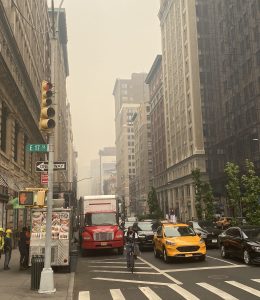 While the sepia tones and brush aromas from this week’s Canadian wildfires’ spillover to the northeast might have looked great in a photograph, or smelled enticing in 1% of its dosage (if seated by a campfire with marshmallows), on the ground in real life it was daunting, and for many systemically disruptive. Personally, I was outdoors plenty, both on my commute and on my break at Union Square farmer’s market, albeit with a mask on, and thankfully did not experience symptoms.
While the sepia tones and brush aromas from this week’s Canadian wildfires’ spillover to the northeast might have looked great in a photograph, or smelled enticing in 1% of its dosage (if seated by a campfire with marshmallows), on the ground in real life it was daunting, and for many systemically disruptive. Personally, I was outdoors plenty, both on my commute and on my break at Union Square farmer’s market, albeit with a mask on, and thankfully did not experience symptoms.
Chinese Medicine nicknamed the lungs “the delicate organ,” which really they are not—in fact quite the opposite—however what is meant by this is their being most and primarily vulnerable to external pathogens. Toxic fumes are an external pathogen. They dry the sinuses and respiratory microbiome, which can bring with it symptoms such as chest oppression, frontal (or maybe temporal) headaches, and of course, dryness. Or as my wife and I learned, if you are a 2-year-old trapped indoors as a result, rabid, recurring cases of cabin fever.
The formula everyone needed at least one day of at home this week was “Xiao Chai Hu Tang,” or “Minor Buplureum (root) Decoction.” It includes buplureum root to clear heat from the upper body by increasing circulation downwards; pinellia root to dissolve accumulation in the chest and sinuses; scutellaria root to clear heat specifically from the lungs; ginseng to generate healthy fluids in the stomach to protect it from the bitter nature of the other herbs; ginger to warm the stomach for a similar reason; and finally licorice and red dates to generate healthy fluids in the stomach, chest, and central nervous system.
It’s no wonder this is one of the most commonly prescribed herbal formulas in Chinese Medicine. Nevertheless, it should almost always be modified according to the individual; especially those with low energy, low appetites, and/or aversions to cold weather. Typically, these were the body types I saw most impacted by the air pollution this week. Frontal headaches, dryness in the throat, and chest oppression, as a result of the external toxicity exacerbating their pre-existing internal toxicities as a result of metabolic dysharmony. Not to worry, as my father always said. There’s hope.
If any symptoms are lingering and you are not presently coming for acupuncture or taking herbs I would recommend any or all of the following:
- Hot mint tea, maybe with honey, to open the chest, cool, and lubricate the sinuses
- Asian pears, or fresh pear juice, also to lubricate the lungs and sinuses.
- Rice congee with chopped up pears, red dates, some honey and cinnamon—YUM—to generate healthy fluids in the respiratory and gastrointestinal microbiomes.
- Gentle exercise, such as qi gong, yoga, or deep breathing. NOT… outdoor running, for the love of God.
- If nothing else, just stay hydrated, preferably with room temperature or hot water. Cold drinks constrict blood vessels, which obviously then traps local inflammation.
These are great treatments to treat only the branch of the problem, as its root cause is of course Republicans.
Caffeine: How, When, and What to Drink
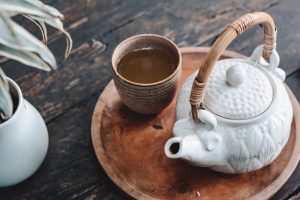
If I had to choose my two personal, favorite vices they would easily be caffeine and alcohol, the latter of which I take mostly in great moderation of course, out of respect for how poisonous it can be to the body. My teacher, Suzanne, often stresses to us that it is important to give the body some time to recover after drinking, inadvertently refuting the notion that 1-2 glasses every day is unacceptable.
As for caffeine, I used to be a “one a day” guy, that is until my baby was born, having since graduated to two a day. I drink an organic half-caf from Purity Coffee shortly after waking, followed by some kind of tea shortly after breakfast.
Functional neurology recommends waiting at least 60 minutes after waking to have your first cup of caffeine, as up until that time the cortisol hormone is still rising and should not be over-stimulated, lest we are more likely to “crash” later on. Chinese Medicine goes a step further (doesn’t it always?) and recommends waiting at least until 7am, as the hours between 5-7am correspond to the “qi” of the large intestine, which is obviously vulnerable to coffee. I say take this information and do your best as it relates to your present lifestyle and struggles.
On days where I have red meat, pork, and/or alcohol the night before I drink green tea, as the green tea leaf has a more cooling effect on the microbiome, regardless of whether taken cold or hot (in fact cold green tea, from a Chinese Medical perspective is highly inadvisable, as few stomachs would benefit from pouring “cold cold” all over it). Other days, which make up the majority, I have black tea, preferably Pu-Erh for its naturally fermented pro-biotics and subsequent healthy warming effect on the gut. Other black teas are fine too, but as with anything consumable in America, it is highly recommended to find a good quality product.
Supermarket tea brands are comprised mostly of dust swept from tea manufacturing plant floors—not real tea leaves—thus will not yield much health benefits at all. It makes me sad and frustrated when I see so many people trying to do the right thing, buying green or black teas or vegetables at the supermarket, knowing they are not being rewarded for their efforts, frankly as a result of capitalism.
If you insist on consuming cold foods for breakfast, such as fruit and or yogurt, it is especially important to have it with black tea and minimize green tea and coffee, the latter of which also ultimately has a “cooling effect” on the stomach, evidenced in how it purges and softens stool.
As sleep is a huge priority for me, I stop drinking all caffeine by 11am. I know conventional medicine recommends 12pm, though I’ve never understood the science behind this beyond its relatively arbitrary marking as the start of “afternoon.” 11am, on the other hand, corresponds with the heart channel in Chinese Medicine’s circadian rhythm, which corresponds with our psycho-emotional health and central nervous system. This makes 11am-1pm an ideal time to reduce hyperactivity in the upper portion of our bodies through things like exercise, as opposed to pouring more stimulation into it with caffeine. Stopping caffeine by 11am also allots us the recommended 12 hours to flush it out of our systems by 11pm, which is the latest advisable bedtime, as per the same circadian rhythm and the body’s natural melatonin secretion.
If you are overly sensitive to caffeine, we generally see it as symptomatic of fluid deficiency in the upper portion of the body, namely the central nervous system, that generally requires herbal medicine and red meat to replenish. If you are overly insensitive to caffeine—people who can drink it right before bed and still get a good night’s sleep—we see it as an excess of pathogenic fluids in the upper portion of the body. This generally requires herbal medicine and avoidance of “damp-causing foods,” such as sugars, gluten, and dairy.
Can It Be All Stress?
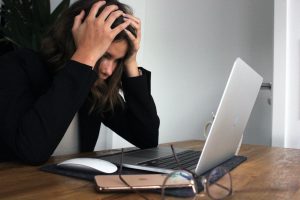 “It’s just stress,” is a diagnostic platitude commonly heard by patients when relaying either to friends or their doctor about some odd or non-immediately fatal symptom that lacks any conventional, empirical treatment.
“It’s just stress,” is a diagnostic platitude commonly heard by patients when relaying either to friends or their doctor about some odd or non-immediately fatal symptom that lacks any conventional, empirical treatment.
It would be an over-simplification to label this stock response as wholly or always dismissive—in my opinion it is more often a result of the listeners’ lack of knowledge of physiological nuances, disease spectrums, and of course the entire internal paradigm of Chinese Medicine.
The mind is en vogue in the past generation, so much so that people jump at the opportunity to sound mentally acute even while being mentally lazy in its default citation as a scapegoat for everything, the way fat was in the 20th century or sugar is now. It makes them feel aware of the more mysterious, all while maintaining an orthodox adherence to conventional medicine’s present understanding of things. I picture people picturing themselves as if sipping a small cup of whiskey wearing Coke bottle glasses and a bowtie in their reply: “It’s (probably just stress),” then putting their cup back down and nodding their head as if they’d just cured HIV.
While no one could dispute that stress is an important variable in the etiology of most illnesses, it is also just that: One important variable. So why when we have curious symptoms that conventional medicine has no explanation or treatment for do they never say: “It’s just diet?” “It’s just your sleep hygiene?” Or: “It’s just your exercise routine that needs refinement or reduction, or simply needs to exist?”
Why when one person experiences incredible stress does it show up as digestive issues, while for another it does as insomnia, and another as hives all over their skin? “People are different,” idiots might shrug and say, which isn’t untrue, but is an egregious oversimplification. People are different, which means if we each consumed diets and partook in exercises suitable to our own individual constitutions, we’d likely be able to ward off the ill effects of short or even medium-term life stressors.
If stress causes you low back or neck pain we know there is “dampness trapped on the exterior layer of the body.” If stress causes stomach issues we know there are already stomach issues, since most or many people can endure stress without such symptoms. If stress causes headaches or migraines then there was likely already some dysregulation of cerebrovascular flow in particular neurological pathways
In this way stress can be invaluably informative, by tipping our internal scale and showing us where we are weak, where in our bodies we are retaining pathogenic fluids, so we can properly treat, instead of dismissing it. Because odd, inexplicable symptoms are never nothing. They are not “all in our minds” or insignificant. Instead, from a Chinese Medical perspective, sadly they are potential coming attractions—foreshadows of diagnoses to come.
I apologize if this sounds dark or ominous. My intention is the opposite, to offer optimism and agency to those of us who have been repeatedly implied to that we must resolve all of our internal turmoil in order to be free of a particular problem. While I am all for a daily practice of meditation, prayer, community, and anything else that reduces stress, we should be able to also rely on medical providers to step in with something more to offer during periods where our practice of psycho-emotional work and discipline just is not enough.

